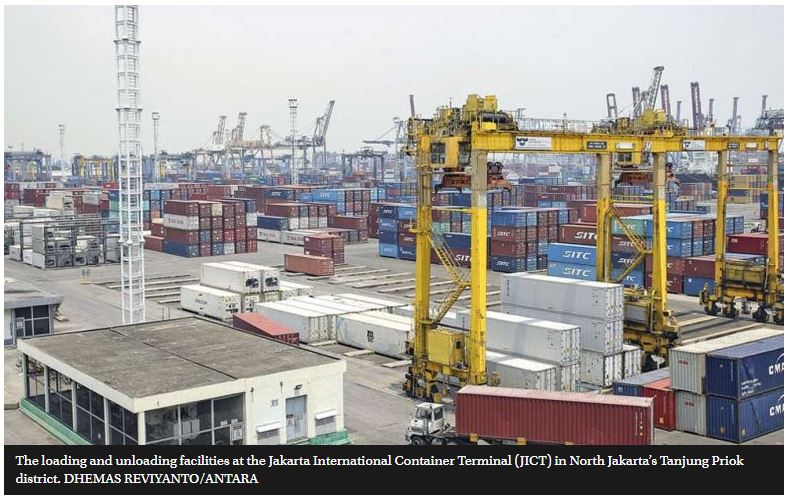Weakening trade foreshadows an Indonesian economic slowdown
Indonesia’s trade data announced on Monday paints a bleak outlook for the country’s economy as it hints at cooling domestic consumption and stagnating investment, the two key contributors to its gross domestic product (GDP).
The country’s exports fell almost 10 per cent year-on-year to $14.28 billion last month while imports plunged deeper by 15.6 per cent annually to $14.20 billion, Statistics Indonesia (Badan Pusat Statistik, BPS) data showed.
Imports of consumer goods to capital goods and raw materials all plummeted in a sign of softening economic activity.
“Overall, with slowing imports – particularly for raw materials and capital goods – domestic investment tends to stagnate amid a similar global trend and increasing United States-China trade tensions,” said private lender Bank Permata economist Josua Pardede.
Monday’s data revealed that auxiliary and raw materials imports nosedived 18.06 per cent year-on-year to $10.36 billion last month while capital goods imports weakened by 5.83 per cent to $2.48 billion in the same period.
The weakening raw material and capital goods imports signals cooling manufacturing and eventually investors’ decision to put business expansions and investments on hold at a time when President Joko “Jokowi” Widodo strives to push the sector higher to accelerate the country’s economic growth.
Indonesia’s economic expansion slowed to 5.05 per cent in the second quarter, its lowest level in the last two years.
At the same time, imports of consumer goods also fell 12.11 per cent year-on-year to $1.37 billion last month.
Indonesia has booked lower imports almost every month in this year, except in June when the figure slightly increased year-on-year as the country was celebrating Idul Fitri at that time.
The country’s consumption usually peaks during the Muslim holidays and boosts imports of consumer goods, as well as of the raw materials needed by local manufacturers to produce more to meet the rising demand.
The plummeting consumer goods imports last month was a sign of weakening household spending, said Institute for Development of Economics and Finance economist Bhima Yudhistira Adhinegara.
“Household spending is expected to slow down below five per cent in the second semester, which would put the overall economic growth at only about five per cent this year, far below the 2019 state budget’s target of 5.3 per cent,” he said.
Household spending accounts for more than half of the country’s GDP, followed by investment.
Finance Minister Sri Mulyani Indrawati previously revised down the government’s expectations for this year’s growth to just 5.08 per cent as consumption is expected to grow between 4.97 per cent and five per cent, down from the 5.33 per cent projected previously. She cited global economic uncertainties as one of the causes, in addition to the domestic economic situation.
‘Weak trade prospects’
Global trade has been hit by Sino-US trade tensions, which are now entering their second year with no end yet in sight. The International Monetary Fund in July announced it expected international trade volumes to grow by 2.5 per cent this year, lower by 0.9 percentage points from its projection made in April.
“Weak trade prospects – to an extent reflecting trade tensions – in turn create headwinds for investment,” the Washington, DC-based institution wrote in its World Economic Outlook in July. “Business sentiment and surveys of purchasing managers, for example, point to a weak outlook for manufacturing and trade, with particularly pessimistic views on new orders.”
Indonesia is no exception, as shown in its weaker exports caused by falling commodity prices, such as those of coal, rubber and palm oil.
The country recorded a fifth month of trade surplus this year with $85.1 million pencilled last month, a reversal from July’s deficit. From January to last month this year Indonesia booked a trade deficit of $1.81 billion, which was still better than the $4.16 billion deficit recorded in the same period last year.
“The surplus value is not as high as we hoped but it is still positive, and it will help fix the trade deficit,” said BPS head Suhariyanto at a press briefing in Jakarta on Monday.
However, economists are of the view that Indonesia is not out of the woods yet.
“Last month’s trade surplus is an unhealthy surplus,” said Bhima. “A healthy surplus is achieved when we see a significant increase in exports amid a drastic drop in imports.”
Josua also urged the government to push the productivity of manufacturers to help increase the country’s exports.
In addition to manufacturing, service sector exports also provided a lucrative source for higher foreign exchange earnings and helped prop up the trade balance, said Centre for Strategic and International Studies economist Yose Riza Damuri.
“Many of these services used to be difficult to export but today’s technology enables such services to be exported with ease, of course, given good telecommunications infrastructure is provided,” he said.
THE JAKARTA POST


 English
English




